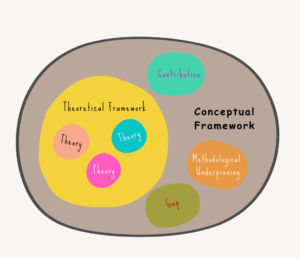Researchers often use the terms theory, theoretical framework, and conceptual framework interchangeably, which can lead to confusion. But fear not! Let’s embark on an exhilarating illustration to untangle these concepts and shed light on their distinct roles.
Theory: A theory is a cohesive set of interconnected ideas, concepts, definitions, and propositions that explain or predict phenomena by outlining relationships among variables. Theories provide systematic explanations and insights that can be tested and validated through research. For instance, the theory of cognitive dissonance in psychology explains how people adjust their attitudes or behaviors to alleviate discomfort from conflicting beliefs.
Theoretical Framework: A theoretical framework is an organized structure of concepts and premises derived from one or more theories, designed to support and guide a study. Creating a theoretical framework involves defining key concepts and theories, establishing logical connections between them, and linking these concepts directly to the research being conducted. This includes conducting a literature review, selecting relevant theories, and demonstrating how these elements will inform the research design, data collection, and analysis. Essentially, it represents the researcher’s intellectual effort to apply established theories to a specific study, ensuring a structured and coherent understanding of the phenomena under investigation.
Conceptual Framework: A conceptual framework justifies why a study should be conducted by describing the current state of knowledge, identifying gaps, and outlining the research’s methodological foundation. It involves a literature review to summarize existing knowledge, highlights areas where understanding is lacking, and establishes the research’s importance and potential contributions. By addressing questions like, “Why is this research important?” and “What contributions might these findings make to existing knowledge?” the conceptual framework sets the stage for the research, explaining its significance and how it will advance current knowledge.

How They Interconnect:
- Theory as the Foundation: Theory provides the starting point with fundamental ideas and propositions that explain or predict phenomena. For example, in studying motivation in education, theories like Maslow’s Hierarchy of Needs or Self-Determination Theory offer essential insights into how and why individuals are motivated.
- Theoretical Framework as a Guiding Structure: The theoretical framework builds on these theories by selecting and organizing them to guide a particular study. It involves defining relevant concepts from the chosen theories, explaining how they interrelate, and applying them to the research question. For instance, in research on student motivation, the theoretical framework might integrate Maslow’s and Self-Determination theories to examine how intrinsic and extrinsic factors influence student engagement. This framework acts as a blueprint, shaping research design, hypotheses, data collection methods, and analysis.
- Conceptual Framework as a Broader Context: The conceptual framework encompasses the theoretical framework and extends beyond it by providing a broader justification for the research. It includes a comprehensive review of the existing literature to summarize what is known, identify gaps or inconsistencies, and explain the significance of addressing these gaps. It outlines the methodological approach, detailing how the study will fill identified gaps. It answers key questions like, “Why is this research important?” and “What contributions might these findings make?” For example, in a study on improving student motivation, the conceptual framework might review current educational practices, identify shortcomings in addressing intrinsic motivation, and propose a mixed-methods approach based on integrated theories of motivation.
In summary, theory lays the groundwork with foundational ideas, while the theoretical framework acts as the scaffolding, organizing these ideas to navigate the study’s course. Meanwhile, the conceptual framework serves as the compass, guiding the study by contextualizing it within the broader landscape of existing knowledge. By identifying gaps and outlining the methodological approach, it justifies the significance of the research endeavor. Together, these components form a cohesive and well-founded research project, ensuring rigor and impact. Understanding the nuances of these distinctions is paramount for researchers, as it enables them to embark on journeys of inquiry with clarity and purpose, ultimately leading to meaningful contributions to their respective fields.
Reference:
Varpio, L., Paradis, E., Uijtdehaage, S., & Young, M. (2020). The distinctions between theory, theoretical framework, and conceptual framework. Academic Medicine, 95(7), 989-994.